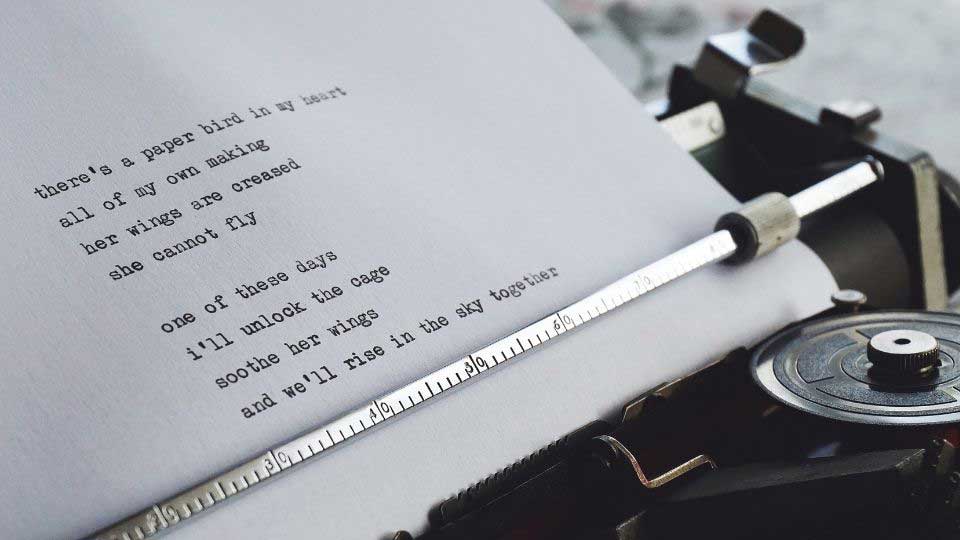
Challenges in translating poetry

Some while ago I wrote a post on the challenges in translating films and I thought it would be interesting to turn this into a series, today’s post focusing on poetry.

Poetry is one of the most mellifluous linguistic devices that man has ever concocted to caress the ears of the listener. As a romantic medium, it is second to none; as a means of recording history, it has made a tremendous contribution; some form of it has been present in every civilised part of the world; as a tool for communication, poetry has a much richer vocabulary than even the very language used to write it!
Why does poetry move us so? That question is highly relevant to our context: if it is the various devices used to evoke emotions that make poetry what it is, then it is these same ‘verbal emotion triggers’ that make poetry a massive challenge to translators. The meters, rhymes, alliterations, metaphors and other devices that make a poem worth reading are nearly impossible to accurately translate into another language. This does not mean that translating poetry is pointless; on the contrary, a translated poem that does justice to the original has just captured a brand new audience for the original writer. This is why the poetry of famous writers from all over the globe is now available in English and a multitude of other languages.
Were it not for poetry translation, all of us would have had to study a new language and reach a proficiency level of a native speaker each time we wanted to read a poem in a tongue unfamiliar to us. Some of the world’s best poetry might be collecting dust in a foreign land were it not for dedicated translators who wanted us to see how beautiful human thoughts can be in a language different from our own. If music is the food of love, then poetry is certainly food for the soul.
Rhyme: The Melody Element
The major challenges in translating poetry, as we have seen, are the devices and nuances that make poetry what it is. Rhyme, for example, is one of the easier devices to mimic in another language. Nearly every culture has rhyming words that are put together in some form, even if only for something as simple as a chant or a war cry. Rhyme is naturally pleasing to the ears and lends a sense of wholesomeness to words that are strung together. In translation, however, maintaining the rhyme of a poem often means interpreting it in a different way – but without losing the gist of the original piece. Linguistic constraints often make this a stimulating task. For example, some syllables are not common to all languages; in such cases, the translator will need to choose an alternate syllable that has a similar effect on the listener – such as using similar-sounding consonants or vowels from the target language.
Rhythm and Meter: The Pulse of Poetry
The rhythmic qualities of poetry are relatively easier to translate because it is merely a matter of matching the number of syllables in each line. However, when actually translating poetry, rhythm, too, may challenge the translator to find meaningful words that match in terms of rhythm as well as rhyme. A simple change in the meter can have a devastating effect on the flow of a poem, and it is the translator’s challenge to find words that will fit their place perfectly. For this reason, only a native-level speaker of two languages can hope to do justice when translating poetry. The translator’s mind must be able to digest the source and produce the result in another language. Even a simple device such as rhythm, therefore, can turn a relatively straightforward paragraph into an enormous task.
Metaphors: Conjuring Images
Among the most devilish devices to ever plague poetry translators is the metaphor. The very quality of metaphors makes them extremely difficult to translate. Metaphors are usually specific to individual languages and do not lend themselves well to interpretation. The phrase ‘as quick as a flash’, for example, cannot satisfactorily be translated as it is; depending on the target language, a relevant alternative may have to be used. Metaphors are also used to conjure images in the mind of the listener; to do justice to a piece of poetry these images must be faithfully delivered to the mind of a listener in another language. Using the same example, the word ‘flash’ might beautifully depict speed in English because of its association with lightning, but saying ‘quick as lightning’ in another language may not have the same visual impact.
Other Devices
Just like rhyme, rhythm and metaphor challenge every translator of poems, there are several other devices that may be used in one language that may not translate well in another. The use of onomatopoeia – words that imitate sounds – is just one example: a ‘gurgle’ or a ‘plonk’ isn’t exactly a translator’s best friend! Hyperboles such as ‘I nearly had a heart attack’ in reference to experiencing trauma or shock might make someone call for medical assistance in another! Puns are especially challenging because these devices play on words to achieve their effect. Similes, alliterations, symbolism, idioms and moods are all devices that add beauty to a poem, and these can never be faithfully translated unless the translator himself (or herself) is also a poet.
Though poetry translation has been carried out for many centuries now, the challenges remain – because of the nuances exhibited by each language. A unique mix of verbal tools goes into the making of a poem, and only a true expert will be able to render it effectively in a different language.
Have you ever translated poetry? What was the biggest challenge and how did you solve it?



9 Comments
A poetry can never be translated perfectly – it is an art.. it is incomparable 🙂
Oh, absolutely. Translation in general is an art and we can never talk about “perfect translation”, as there is no such thing. When it comes to poetry, it is even more so.
I have a couple of poems by the poet Kenneth Patchen that I translated up on my website. I chose them because they were pretty free and anarchic in English and full of weird metaphors that he had created – so absolute freedom to invent myself. The challenge: finding rhythms and tone….
I just had a look and you are right. His poems do allow the translator quite a bit of freedom. Yet, like you say, finding the right tone may not be that easy.
I Feel that the person who is fit for translating poetry should be a poet who has a good articulation for the two languages that we translate from and to.
absolutely!!! Anyway there will be a lot of distortions of meaning in translating Poetry. I’ve tried million times at least be close in meaning,nevertheless I had to change it in order to find a rhyme,
It is also a matter of deciding whether it’s the message that matters more, or if there’s a focus on the form (keeping the rhyme in the case you mentioned). It would be very unusual to be able to preserve both.
i’m not sure i’d agree that poetry can ever be translated…at least not with poetic justice : )
You’re absolutely right! It really is totally different, isn’t it? Thanks for stopping by.